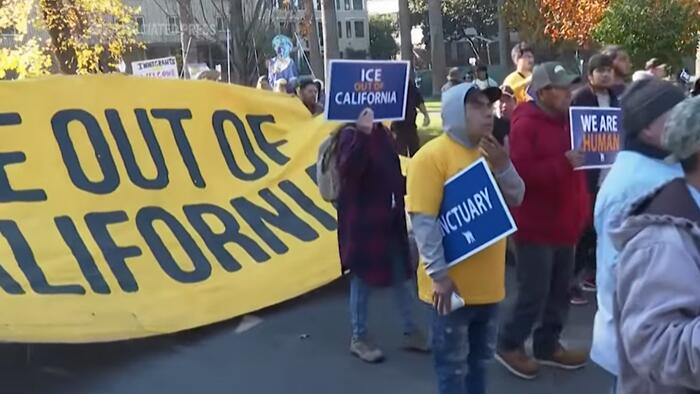In recent events surrounding immigration policy in the United States, significant protests have erupted in California, particularly in response to the state’s commitment under the “California Values Act.” This legislation limits cooperation between state authorities and federal immigration enforcement, a move aimed at resisting former President Donald Trump’s proposed mass deportation plans. During a demonstration at the California Capitol, hundreds of activists rallied, carrying signs with messages like “Not one cent for mass deportation” and “MAGA out of California.” This representative pushback reflects a broader movement seen in states like California and New York, where local governments have taken a stand against aggressive federal immigration enforcement initiatives, asserting their rights to protect immigrant communities.
The conflict between federal immigration enforcement and state policies raises critical questions about state versus federal authority. Advocates argue that states like California and New York should have the autonomy to establish policies that mirror their values of inclusivity and humane treatment of undocumented residents. The crux of the issue lies in the interpretation of authority; while these states push for protections on behalf of immigrants, it remains a contentious point that under U.S. law, federal statutes typically take precedence over state regulations. This legal framework creates a battleground where state governments push back against what they view as punitive and inhumane federal policies, leading to an ongoing clash over jurisdiction.
Adding to the tension, Texas has seen significant enforcement actions along its southern border, where Governor Greg Abbott has controversially seized public land to construct barriers aimed at controlling illegal immigration. The Supreme Court’s mixed rulings on Abbott’s border measures underscore the complexity surrounding state-level immigration policy enforcement. A recent U.S. appeals court supported Texas’ position in a limited capacity, allowing the state to construct razor wire while also affirming federal oversight regarding immigration laws. This legal back-and-forth highlights the confusion and inconsistency in how federal authority is applied in different jurisdictions, often leading to legal grey areas that pit state and federal interests against one another.
The impending 2024 presidential campaign further complicates the immigration landscape, as Trump reaffirms his pledge to carry out mass deportations, igniting fear among immigrant communities. Many individuals and families, particularly those with mixed immigration statuses, are preparing for a potential crackdown on undocumented immigrants, with legal experts advising them to take necessary precautions. These fears are palpable among long-term residents who worry about the impacts of deportation on their families, particularly those who lack legal status due to illegal entry. The looming threat of policy shifts raises concerns about the stability of families and the emotional toll on those facing potential separation.
As immigration policies become a focal point in the political arena, debates around the practicality and morality of mass deportation intensify. Critics argue against a blanket approach, advocating instead for targeted deportations of individuals who pose criminal threats while ensuring protections for those who contribute positively to society. This nuanced perspective challenges the notion that mass deportation could be both economically feasible and morally justifiable. Advocates emphasize that many immigrants are vital to the workforce, filling jobs in sectors like agriculture and construction, and suggest that a reasonable reform plan would benefit both the economy and community welfare.
Moving forward, the call for a comprehensive and pragmatic immigration policy is crucial. A balanced approach would consider security needs while recognizing the humanitarian aspects of immigration. Proposed strategies include reinforcing border security, reinstating effective immigration programs, and developing thoughtful case-by-case immigration procedures. This middle ground acknowledges the complexities involved in immigration but also supports rational strategies that protect the nation, respect human rights, and address economic requirements effectively. By engaging in constructive dialogue, policymakers can develop immigration solutions that resonate with the multifaceted realities of today’s migrant landscape.

